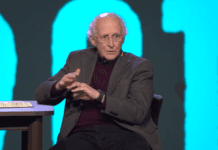Pastor Eric Mason addressed reparations for African Americans in his sermon to Epiphany Fellowship Church in Philadelphia, Pennsylvania on Sunday, August 23rd. Many people ask if reparations are necessary if one has already been forgiven and even question whether reparations are a “gospel issue.” Preaching from Luke 19:1-10 (the passage about Zacchaeus the tax collector), Mason proceeded to make a case for reparations being not only a “gospel issue” but arguing that “correcting the effects of sin on others” represents the fruit of conversion.
“Africans were released from slavery without any counseling, without any economic plan, without any opportunity,” Mason said. African Americans were “left out there in a way that we would say wasn’t restorative for them being kidnapped by their kidnappers…and imported into this country as an import versus an immigrant,” the pastor said.
Mason was preaching from an “unchartered” location in north Philadelphia. He was preaching from what he called “ground zero” of brokenness in Philadelphia; Dr. Mason even mentions why he kept looking around, and even addressed someone in person during the sermon, saying “I’m talking about reparations for black people.”
Pastor Eric Mason: The Bible Gives Examples of Reparations
Mason explained what makes Zacchaeus’ interaction with Jesus noteworthy is his repentant and immediate reaction. The preacher emphasized verse 8: “And Zacchaeus stood and said to the Lord, ‘Behold, Lord, the half of my goods I give to the poor. And if I have defrauded anyone of anything, I restore it fourfold.’” Zacchaeus is not saved by giving to the poor (verse 9), but he is saved because of his response to Jesus. Mason explains, “His repentance bears fruit!” He showed that Zacchaeus went beyond general alms giving (an offering), and said for anyone he had extorted he’d pay back four times as much. Mason then pointed out, “it wasn’t just enough to show that he had changed, but also to correct something that he did.”
Mason went on to say that the word “extort” is the exegetical springboard for understanding the issue of reparations in America. “This exegetical statement here is powerful, because it says to oppress someone, and cheating them, and extorting them…who’s more extorted than black people in America?” he asked. Black people in America were extorted because “we gave you 256 years of free labor with nothing but poor eating, and poor places to stay.”
When people say black folk is lazy, I’m like we sure built the country on some lazy people huh?
Paying back four times as much is an Old Testament principle, Mason explained, citing Exodus 22:1 as an example. He also used Numbers 5:7 to discuss why Zacchaeus was willing to pay above and beyond what he took. Zacchaeus did this so he could help the people he wronged and also to show how repentant he was for the sins he had committed. “This is what reparations does,” Mason explained, “What would their life be like, if I didn’t interfere with their advancement…restitution thinks that way.” Mason also used Proverbs 14:9 and Exodus 22:12 to bolster his argument for the Scriptural basis of restitution.
Generational Restitution
Speaking from Ezra 1:4, Mason illustrated how the children of Israel received restitution from Cyrus, the King of Persia after their captivity and exile at the hands of the Babylonians; the silver, gold, and livestock were for the people, the offerings for the house of God. He said, “it would be unjust to send them back to their land without anything to be able to begin to build their own independent economy.” That time in Jewish history wasn’t the first time they had been paid reparations, either. Reparations in Exodus 12:35-36 are a direct result of the Israelite’s protesting Pharaoh to let God’s people go, Mason explained.
Mason compared this treatment of the Jews to America’s treatment of African Americans:
There’s nothing that’s been done in this country comprehensively as a system, beyond a ‘handout’ versus a ‘hand-up’ to help there to be economic independence among black people.
“Jesus in verse 9 of Luke 19 connects Zacchaeus’ willingness to pay reparations as a sign that he had been changed by the gospel.” Mason asked how many listening say racism doesn’t exist, and specifically addressed those who don’t feel obligated to pay reparations. “If you are resisting restitution for black people because of what’s happened in this country, you may want to check your justification monitor.”
The gospel isn’t just a message that changes the soul, it is the power of God to change everything. So reparations fits in the scope of the gospel.
Mason then gave some history of when and how America has paid reparations, which can be seen here. Summarizing his thoughts on how reparations have been paid historically, Mason said “America has slapped black people in the face because of the inequitable ways they’ve been treated.” Additionally, Mason believes the church has a unique role to play in righting this wrong:














